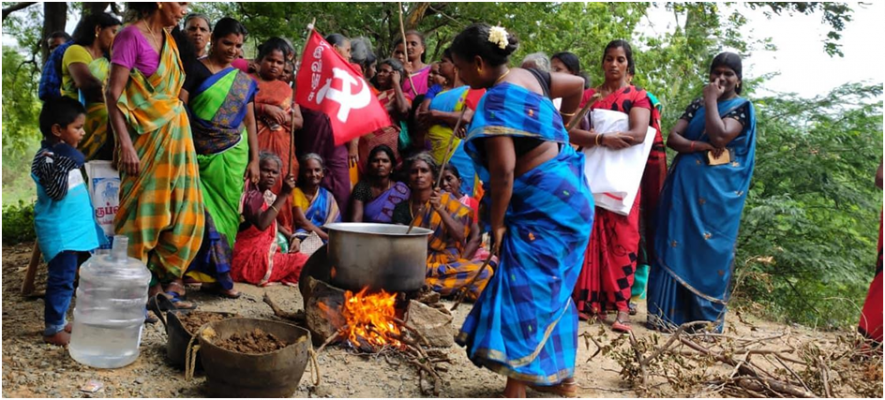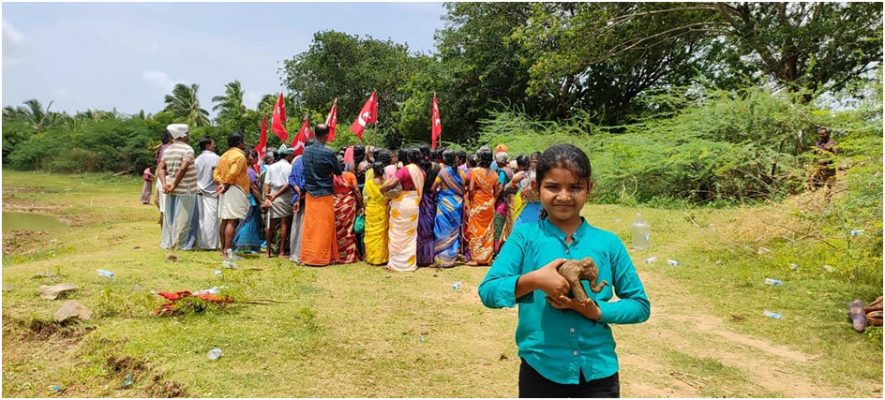TN: Pottery Workers in Kanyakumari Seek Government Intervention
Pottery workers led by AIAWU heading to a water body seeking permission for excavating clay and grog in the Kanyakumari district
Earthen pot makers in the Kanyakumari district are facing multiple challenges in sustaining their skilled jobs. Finding clay and fine grog has become a challenging task with several restrictions by the government, while the shift towards other forms of vessels has hit the workers hard.
With no guarantee on assured prices for their products, the workers continue to demand stronger and more effective cooperative societies to protect and sell the goods in the market.
Another major challenge facing the workers is the climate prevailing in Kanyakumari, which receives two monsoons every year, leaving the workers without work and income for almost seven months.
Few other factors, including the quality of the clay and grog used, along with the firewood used for baking the earthen goods, have made their jobs more challenging.
The workers look up to the government to ensure their livelihoods are protected, with provisions to excavate the required clay and fine grog along with other basic facilities.
'ONE OF THE OLDEST ART FORMS'
Making clay pots or any pottery item has existed since the early historical period. The excavations in several parts of the country and Tamil Nadu, in particular, led to the discovery of pottery items, helping estimate the period of civilisation.
Apart from household goods, a variety of decorative items are also being identified, proving the existence of the art form for centuries back. The work requires extraordinary skills, beginning from mixing and seasoning the clay and fine grog, making the good and baking it in the firewood-run oven.
"This art form has existed for several centuries, as weapons and clay pots were made by people in the ancient civilisation for their survival. The excavations happening across the country and Tamil Nadu in specific have brought up several findings of clay suggesting the age of the civilisation," said H Ayyappan, a pottery worker from Thazhakudy village in Kanyakumari district.
Hundreds of workers in the small hamlet are involved in making different types of pots for a variety of requirements.
“Temples, households and gardening goods are the major requirements we receive. But, the demand has reduced as people have shifted to other forms of vessels, though a good percentage are now returning to use pottery,” Ayyappan said.
‘RESTRICTIONS AFFECTING THE WORKERS’
The restrictions on excavating clay and fine grog have hit the workers across the district leading to protests by the All India Agricultural Workers Union (AIAWU). The workers are made to run from one department to another to even submit the application form for seeking permission for excavation.
"Since ancient days, we were permitted to take clay and grog from water bodies for free. What we do is a desilting process, since clay can only be taken from the middle of the water bodies, which helps in increasing the storage capacity of the tanks," S Ramesh, another pottery worker, said.

Women preparing food for the protesting workers at the protest site
The regulation in excavating clay by the revenue, mining and public works department (PWD) has led to the distress of the workers.
"We were permitted to take clay and grog once the harvesting season gets over. But now, we are restricted from doing so. We demand the state government and district authorities to ensure smooth processing of our permission forms and grant permission," Ramesh said.
The AIAWU and the Pottery Workers Union have demanded to earmark 15 water bodies to keep their jobs and livelihood alive.
"As of now, the concerned department has earmarked two water bodies for the workers to excavate clay. This is insufficient, and we demand an increase in the water bodies or restore the old system of excavation after the harvesting season," said N S Kannan, president of AIAWU's Kanyakumari district unit.

A girl made an elephant using clay while the protesting workers were holding talks with police and revenue officials.
‘STRENGTHEN COOPERATIVES’
The workers have also demanded the strengthening of the cooperative system for sustainability. The existing few cooperatives are in ruins as the departments have paid very little attention to these workers.
“The cooperative system is in place only in a few villages, which requires huge attention from the government. The buildings are poorly maintained and are insufficient to store the products. Only a strong cooperative system can help in saving the workers,” Ayyappan said.
The lack of sufficient space and imparting skills remains another demand of the workers since more training is required for different types of products and space to store them.
"For this industry to flourish, the government should set up a park in around 10-15 acres with facilities to store clay and grog, making of products, oven for baking the goods and storing the finished goods. Such a system will help in surviving this industry," Kannan said.
The demand for relief during the rainy season is another long-pending demand that any of the state governments have not addressed. The skilful and artistic workers now pin their hopes on the aid and proactive steps of the government to stay afloat.
Get the latest reports & analysis with people's perspective on Protests, movements & deep analytical videos, discussions of the current affairs in your Telegram app. Subscribe to NewsClick's Telegram channel & get Real-Time updates on stories, as they get published on our website.
























